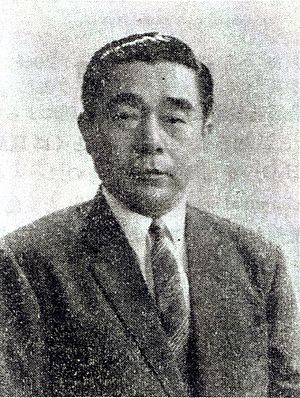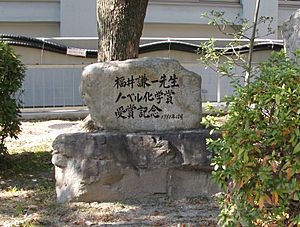Kenichi Fukui facts for kids
Quick facts for kids
Kenichi Fukui
|
|
|---|---|
 |
|
| Born | October 4, 1918 Ikoma District, Nara, Japan
|
| Died | January 9, 1998 (aged 79) Kyoto, Japan
|
| Nationality | Japanese |
| Citizenship | Japan |
| Alma mater | Kyoto Imperial University |
| Known for | Frontier orbitals Fukui function |
| Spouse(s) | Tomoe Horie (m.1947) |
| Children | Tetsuya Fukui(son) and Miyako Fukui(daughter) |
| Awards |
|
| Scientific career | |
| Fields | Chemistry |
| Institutions | Kyoto University |
| Influenced | Roald Hoffmann Akira Yoshino |
Kenichi Fukui (福井 謙一, Fukui Ken'ichi, October 4, 1918 – January 9, 1998) was a Japanese chemist. He was the first person from Asia to win the Nobel Prize in Chemistry.
Fukui shared the 1981 Nobel Prize in Chemistry with Roald Hoffmann. They both studied how chemical reactions happen. Fukui's award-winning work focused on "frontier orbitals." These are special places where electrons are found in molecules. He looked at the Highest Occupied Molecular Orbital (HOMO) and the Lowest Unoccupied Molecular Orbital (LUMO). He showed how these orbitals help us understand why chemicals react the way they do.
Early Life and Education
Kenichi Fukui was born in Nara, Japan. He was the oldest of three sons. His father, Ryokichi Fukui, was a merchant.
When he was a student from 1938 to 1941, Fukui became very interested in quantum mechanics. This is a part of physics that studies tiny particles. He also believed that big science discoveries happen when different fields of study come together.
A friend of his father, named Kita, suggested Kenichi study industrial chemistry. Kenichi found chemistry hard at first because it seemed to need a lot of memorizing. He preferred the logical side of chemistry. He followed his mentor's advice and went to Kyoto University in Japan.
Fukui also preferred theoretical chemistry, which uses ideas and math. But he spent a lot of his early career doing experimental chemistry. He completed over 100 experimental projects. He even enjoyed seeing the results of his experiments. Later, as a teacher, he would suggest experimental projects for his students. This helped them learn both theoretical and experimental science. After graduating from Kyoto Imperial University in 1941, Fukui worked for the Japanese Army Fuel Laboratory during World War II. In 1943, he became a lecturer at Kyoto Imperial University. He started his career as an organic chemist.
Discoveries and Research

Fukui was a professor of physical chemistry at Kyoto University from 1951 to 1982. He also led the Kyoto Institute of Technology and the Institute for Fundamental Chemistry. He was president of the Chemical Society of Japan from 1983 to 1984. He received many awards, including the Japan Academy Prize in 1962 and the Person of Cultural Merit in 1981.
In 1952, Fukui and his team shared their ideas about how molecules react. They published their work in the Journal of Chemical Physics. At first, other chemists did not pay much attention to his ideas. Fukui later said that his early work was not explained well enough.
His "frontier orbitals" idea became more recognized after 1965. That year, Robert B. Woodward and Roald Hoffmann published their Woodward–Hoffmann rules. These rules could predict how fast two chemicals would react. They explained why some chemicals react easily and others do not. These rules were based on how the parts of molecules are arranged and where their electrons are. Fukui realized that his ideas about frontier orbitals were very important for understanding many chemical reactions.
What was amazing about Fukui's work is that he developed his ideas before scientists had powerful computers. Besides studying chemical reactions, Fukui also contributed to other areas of chemistry. These included the study of gelation, making new chemicals using salts, and how polymerization happens.
In an interview in 1985, Fukui talked about science in Japanese universities and industries. He felt that the old "chair system" in universities limited young scientists. He believed young people should be encouraged to do original work early in their careers. He also said that industries in Japan focused too much on daily business. He wanted them to support long-term research, even if the goal was not clear at first. He noted that Japan was still catching up with Western countries in basic science. However, he also said that funding for basic science in Japan was getting better.
Why His Work Was Important
Fukui won the Nobel Prize because he found a simple way to understand how chemicals react. He looked at the frontier orbitals (HOMO and LUMO). His ideas were based on three main observations about how molecules interact:
- Electrons in occupied orbitals of different molecules push each other away.
- Positive parts of one molecule attract negative parts of another.
- The occupied orbitals of one molecule and the empty orbitals of another (especially HOMO and LUMO) attract each other.
From these ideas, the frontier molecular orbital (FMO) theory simplifies how chemicals react. It focuses on the interaction between the HOMO of one molecule and the LUMO of another. This theory helps explain the Woodward-Hoffmann rules for certain types of reactions.
Fukui was elected a Foreign Member of the Royal Society in 1989.
See also
 In Spanish: Ken'ichi Fukui para niños
In Spanish: Ken'ichi Fukui para niños
- List of Japanese Nobel laureates
- List of Nobel laureates affiliated with Kyoto University
 | Ernest Everett Just |
 | Mary Jackson |
 | Emmett Chappelle |
 | Marie Maynard Daly |

